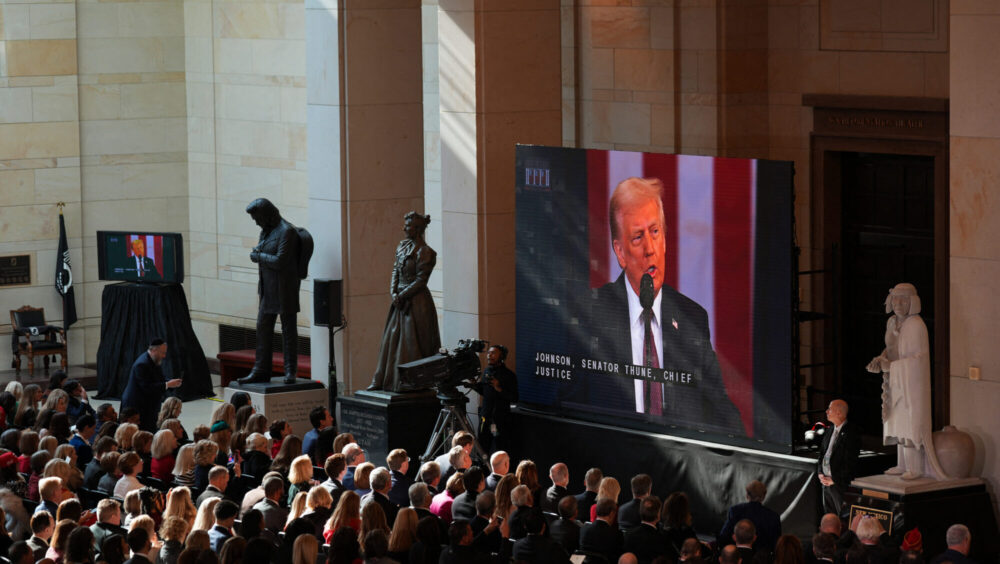
President Donald Trump is seen on screen in Emancipation Hall as he delivers his inaugural address on January 20, 2025
POOL / GETTY IMAGES NORTH AMERICA / Getty Images via AFP
French-language Belgian television (RTBF) distinguished itself on the occasion of Donald Trump’s inauguration by broadcasting his speech not live but with a delay that was supposed to allow ‘politically dangerous remarks’ to be examined. The decision is sparking controversy over the relevance of the media cordon sanitaire rule that has been in force in Belgium since the 1990s.
On Monday, January 20th, the public broadcaster RTBF, which serves the French-speaking population of Belgium, devoted a special edition to the inauguration of Donald Trump and, like most television channels around the world, broadcast the speech given by the new president of the United States. However, the broadcast was not live, but with a two-minute delay.
This was a conscious choice by the channel’s directors. “We have noted on several occasions that Donald Trump has made racist, far-right, and xenophobic comments, and has also incited hatred. We decided to broadcast his speech with a slight delay to allow time for analysis. It’s a practice we’ve already been applying for many years at RTBF in French-speaking Belgium, and which we call the media cordon sanitaire,” explained Aurélie Didier, deputy editorial director of news at the channel.
The term cordon sanitaire has a slightly different meaning in Belgium than it does in France.
In France, the cordon sanitaire means that the political parties of the left and centre use every means possible to exclude parties deemed to be outside the ‘republican arc’—that is, the Rassemblement National (RN). It mainly involves withdrawal agreements at election time to prevent the election of RN representatives.
In Belgium, the cordon sanitaire, which also aims to exclude national right-wing political parties from any political majority, was put in place in 1989, following an electoral victory for the Vlaams Blok party (which has since become Vlaams Belang). It is reflected in the French-language audiovisual media by the exclusion from direct airtime of parties deemed to be “carrying discriminatory or anti-democratic proposals.” Representatives of the far-left PTB (Parti du Travail de Belgique) or the rising Islamist party, on the other hand, are regularly honoured on radio and television.
The management of RTBF defends itself against any accusations of censorship, explaining that this practice “avoids trivialising such comments or normalising them.”
Not everyone was happy with this choice. The channel’s society of journalists disapproved of the management’s choice, calling the application of the cordon sanitaire “inaccurate, ignorant and insulting.” Jacqueline Galant, minister for the media of the Government of the French-speaking Community of Belgium, announced to the Walloon Parliament her intention to “question” RTBF about this decision, deeming the measure meaningless and ineffective, since Trump’s remarks were available live on other French-speaking channels that had not applied this policy.
The Mouvement Réformateur (MR), a right-wing party in the French-speaking part of Belgium to which Galant belongs, also expressed shock at RTBF’s decision through MP Georges-Louis Bouchez, who also appeared in the French media. Bouchez is regularly in the crosshairs of the Belgian press for his courageous attempts to break the left-wing monopoly in the media, associations, and education system.
Many people in French-speaking Belgium are now questioning the persistence of the cordon sanitaire. The French-language media in Belgium claim the right to define who is ‘far Right’ and who is not, without ever giving a precise definition of the term. “The term seems to encompass any criticism of mass immigration, Islam, abortion rights, global warming, or support for Donald Trump,” laments former Belgian senator Alain Destexhe in an article published in Le Figaro, pointing out that the Belgian version of the cordon sanitaire has no legal basis and is even unconstitutional.
The French-language Belgian press, which is notoriously left-wing, has been particularly hostile to the new American president. “Trump: premier criminel à la Maison-Blanche,” (Trump: first criminal at the White House) was the headline a few days ago in the daily Le Soir.
